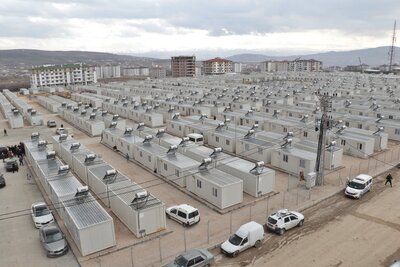
On February 6 2023, a magnitude 7.8 earthquake struck southern Türkiye near the Syrian border. This was followed roughly nine hours later by a magnitude 7.5 earthquake located approximately 95 kilometers to the southwest. The first earthquake was the most catastrophic to hit earthquake-prone Türkiye in more than 20 years, and it was as intense as the one in 1939, the most violent recorded there.
According to seismologists, the earthquakes in Kahramanmaraş were among the most widespread in the region's history, causing a crack that extended more than 100 kilometers to Anatolia and the Arabian Peninsula.
The unfortunate earthquake also had devastating effects on supply chains and manufacturing lines heavily affecting the Turkish economy, the 19th largest economy in the world with a GDP of approximately $1 trillion USD. However, this tragedy appears to have resulted in high inflation, a temporary collapse in the stock market, and notable damages in the agriculture economy, combined with critical factors such as rising raw material costs and new worker wages implemented in early 2023, all resulting in significant cost increase.
Evidently manufacturers reduced their purchasing activity as a result of the disaster, with input stocks also decreasing. Firms, particularly those near or within the affected provinces, halted production, and customers were also impacted; supply-chain disruption was noticeable.
The S&P Global Market Intelligence agency said: "The terrible earthquake[s] in February impacted the Turkish manufacturing sector during the month, with supply chains and production lines affected in particular. Hopefully we will see signs of recovery in the affected areas and across the sector as a whole in the months ahead."
As much as this disaster crushed people's hearts, it also brought people's minds and souls together as many of them provided help and in-field assistance to all affected areas and provinces despite being devastated, having lost their homes and loved ones, yet many continue to respond around the clock every day to provide lifesaving care.
More than 9,000 volunteers and professionals from the Syrian Arab Red Crescent and Turkish Red Crescent have been on the ground assisting since the first two earthquakes. The Turkish Red Crescent, in collaboration with the Ministry of Health, is currently providing health care in rural regions and in temporary shelters to help enhance access to services, with technical assistance from the IFRC (International Federation of Red Cross and Red Crescent Societies) .
Humanitarian aids were not the only efforts done; the Turkish government has committed to restore homes within a year. Meanwhile, 35 Container Cities were established (4 in Erciş, 31 in Van) and inhabitants were relocated there. 175.000 people were housed in containers with two rooms, a kitchen, and a bathroom.
Container cities met all of the needs of their inhabitants. Citizens' basic needs (electricity, water, etc.) were met for free in containers with infrastructure provided by the state. The Governorship of Van supplied blankets, beds, food, and cooking kits to Van Central container cities.
Till date of this article, approximately 900 new housing units had already been built, and 500 were ready for occupancy. In a video message he addressed to the World Government Summit 2023, President Erdoğan said: " We will soon begin reconstructing and recovering our shattered cities. As the Turkish state, together with our nation, we will quickly heal the wounds caused by this disaster."